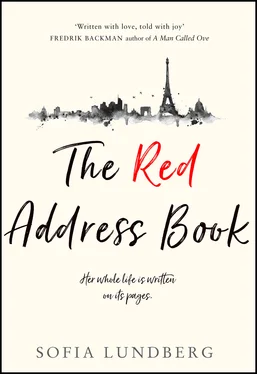“I must have.” The words stick, and she clears her throat.
“Here, have some water.” The caregiver is quick to hold out a glass, and Doris takes a few sips.
“Thank you … Sorry, but I’ve forgotten your name.” It’s a new girl again. The old one left; she was going back to her studies.
“It’s me, Doris. Ulrika. How are you today?” she asks, but she doesn’t stop to listen to the answer.
Not that Doris gives one.
She quietly watches Ulrika’s hurried movements in the kitchen. Sees her take out the pepper and put the saltshaker back in the pantry. In her wake she leaves creases in the tablecloth.
“No extra salt, I’ve told you,” Ulrika says, with the tub of food in her hand. She gives Doris a stern look. Doris nods and sighs as Ulrika peels back the plastic wrap. Sauce, potatoes, fish, and peas, all mixed together, are tipped out onto a brown ceramic plate. Ulrika puts the plate in the microwave and turns the dial to two minutes. The machine starts up with a faint whirr, and the scent of fish slowly begins to drift through the apartment. While she waits, Ulrika starts to move Doris’s things: she stacks the newspapers and mail in a messy pile, takes the dishes out of the dishwasher.
“Is it cold out?” Doris turns back to the heavy drizzle. She can’t remember when she last set foot outside her door. It was summer. Or maybe spring.
“Yeah, ugh, winter’ll soon be here. The raindrops almost felt like tiny lumps of ice today. I’m glad I’ve got the car so I don’t have to walk. I found a space on your street, right outside the door. The parking’s actually much better in the suburbs, where I live. It’s hopeless here in town, but sometimes you get lucky.” The words stream from Ulrika’s mouth, then her voice becomes a faint hum. A pop song; Doris recognises it from the radio. Ulrika whirls away. Dusts the bedroom. Doris can hear her clattering around and hopes she doesn’t knock over the vase, the hand-painted one she’s so fond of.
When Ulrika returns, she is carrying a dress over one arm. It’s burgundy, wool, the one with bobbled arms and a thread hanging from the hem. Doris had tried to pull it loose the last time she wore the dress, but the pain in her back made it impossible to reach below her knees. She holds out a hand to catch it now, but grasps at thin air when Ulrika suddenly turns and drapes the dress over a chair. The caregiver comes back and starts to loosen Doris’s dressing gown. She gently pulls the arms free and Doris whimpers quietly, her bad back sending a wave of pain into her shoulders. It’s always there, day and night. A reminder of her age.
“I need you to stand up now. I’ll lift you on the count of three, OK?” Ulrika places an arm around her, helps her to her feet, and pulls the dressing gown away. Doris is left standing there, in the kitchen, in the cold light of day, naked but for her underwear. That needs changing too. She covers herself with one arm as her bra is unhooked. Her breasts fall loosely towards her stomach.
“Oh, you poor thing, you’re freezing! Come on, let’s get you to the bathroom.”
Ulrika takes her hand and Doris follows her with cautious, hesitant steps. She feels her breasts swing, clasps one arm tight against them. The bathroom is warmer, thanks to the under-floor heating beneath the tiles, and she kicks off her slippers and enjoys the warmth beneath the soles of her feet.
“Right, let’s get this dress on you. Lift your arms.”
She does as she is told, but she can raise her arms only to chest height. Ulrika struggles with the fabric and manages to pull the dress over Doris’s head. When Doris glances up at her, Ulrika smiles.
“Peekaboo! What a nice colour, it suits you. Would you like some lipstick as well? Maybe a bit of blusher on your cheeks?”
The makeup is set out on a little table by the sink. Ulrika holds up the lipstick, but Doris shakes her head and turns away.
“How long will the food be?” she asks on her way back to the kitchen.
“The food! Ah! What an idiot I am, I forgot all about it. I’ll have to heat it up again.”
Ulrika hurries to the microwave, opens the door and slams it shut again, turns the dial to one minute, and presses start. She pours some lingonberry juice into a glass and places the plate on the table. Doris wrinkles her nose when she sees the sludge, but hunger makes her lift the fork to her mouth.
Ulrika sits down across from her, with a cup in her hand. The hand-painted one, with the pink roses. The one Doris herself never uses, for fear of breaking it.
“Coffee, it’s liquid gold, it is,” Ulrika remarks. “Right?”
Doris nods, her eyes fixed on the cup.
Don’t drop it.
“Are you full?” Ulrika asks after they have been sitting in silence for some time. Doris nods and Ulrika gets up to clear away the plate. She comes back with steaming coffee in yet another cup. A dark blue one, from Höganäs.
“There you go. Now we can catch our breath for a moment, hmm?”
Ulrika smiles and sits down again.
“This weather, nothing but rain, rain, rain. It feels like it’s never ending.”
Doris is just about to reply, but Ulrika continues:
“I wonder if I sent any extra socks to the nursery. The little ones will probably get soaked today. Oh well, there must be spares they can borrow. Otherwise I’ll be picking up a grumpy sockless kid. Always this worrying about the kids. But I suppose you know what it’s like. How many children do you have?”
Doris shakes her head.
“Oh, none at all? You poor thing, so you never get any visitors? Have you never been married?”
The caregiver’s pushiness surprises Doris. These young women don’t usually ask this kind of question, at least not so bluntly, anyway.
“But you must have friends? Who come over occasionally? That looks thick enough, anyway.” She points to the address book on the table.
Doris doesn’t answer. She glances at the photo of Jenny. It’s in the hallway, but the caregiver has never even noticed it. Jenny, who is so far away and yet always so close in her thoughts.
“Well, listen,” Ulrika continues. “I’ve got to rush off. We can talk more next time.”
Ulrika loads the cups into the dishwasher, even the hand-painted one. Then she turns the machine on, gives the counter one last wipe with the dishcloth, and before Doris knows it, she’s out the door. Through the window, she watches Ulrika pull on her coat as she walks, and then climb into a little red car with the agency’s logo on the door. With shuffling steps, Doris makes her way to the dishwasher and pauses the wash. She pulls out the hand-painted cup, carefully rinses it, and then hides it at the very back of the cupboard, behind the deep dessert bowls. She checks from every angle. It’s no longer visible. Pleased, she sits back down at the kitchen table and smooths the tablecloth with her hands. Arranges everything carefully. The pillbox, the lozenges, the plastic case, the magnifying glass, and the phone are all back in their rightful places. When she reaches for the address book, her hand pauses, and she allows it to rest there. She hasn’t opened it in a long time, but now she lifts the cover and is met by a list of names on the first page. Most have been crossed out. In the margin, she has written it several times. One word. Dead.
A. ALM, ERIC
So many names pass by us in a lifetime. Have you ever thought about that, Jenny? All the names that come and go. That rip our hearts to pieces and make us shed tears. That become lovers or enemies. I leaf through my address book sometimes. It has become something like a map of my life, and I want to tell you a bit about it. So that you, who’ll be the only one who remembers me, will also remember my life. A kind of testament. I’ll give you my memories. They’re the most beautiful thing I have.
Читать дальше












